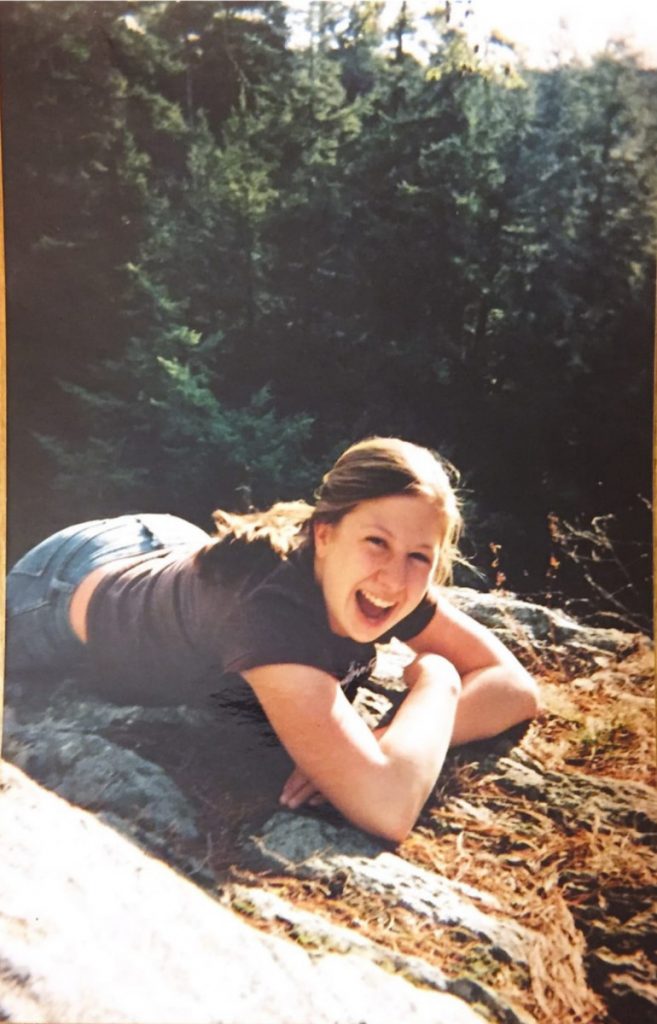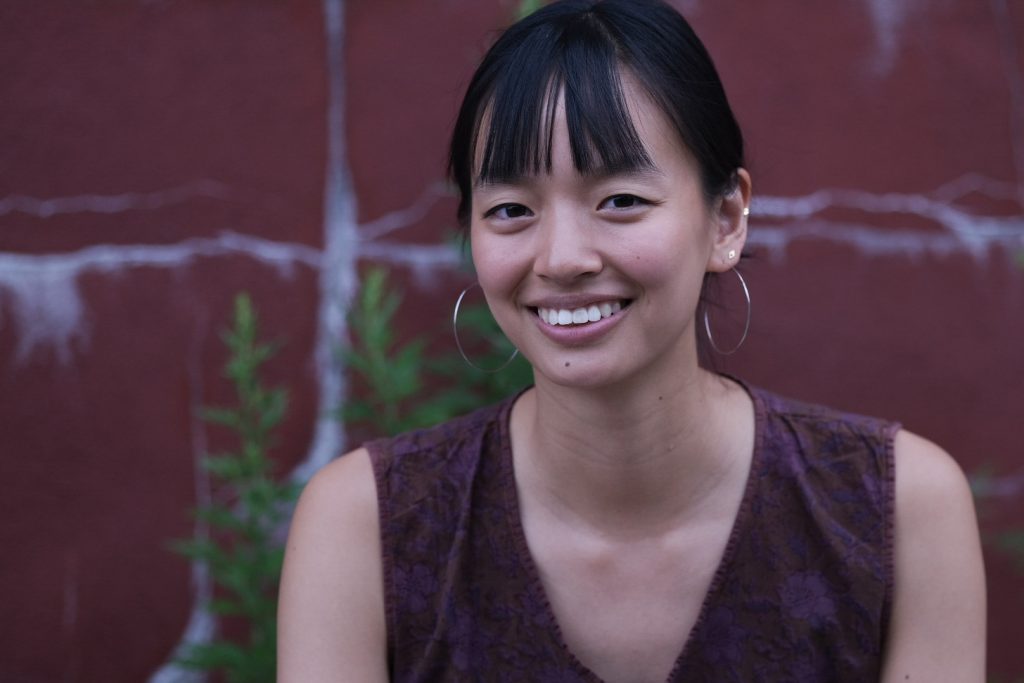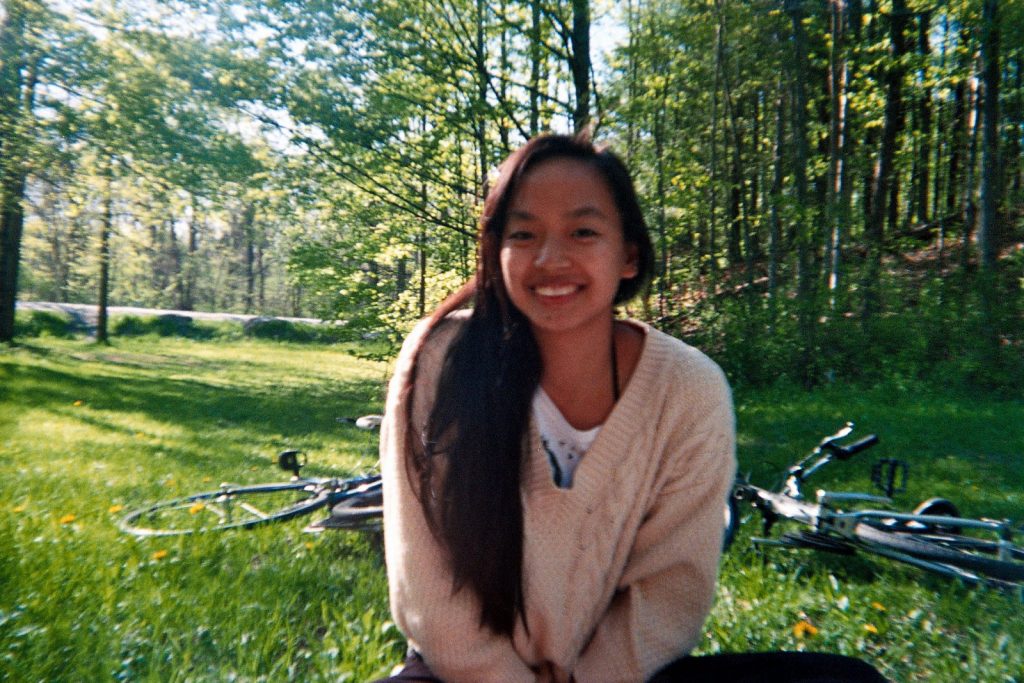Gretchen Schrafft during her time at Middlebury (left) and today (right).
Intern Cristina Farfan ’21 interviews fiction writer Gretchen Schrafft ’08, who was an intern for NER in 2007 while she was a student at Middlebury College, and then went on to be a staff reader for the magazine. At Middlebury, she completed a double major in English and American Literatures and Sociology-Anthropology. Discussing both NER and her own writing, Schrafft gives an insight on her path from NER intern to published fiction writer.
Cristina Farfan: Where are you now, both geographically and professionally?
Gretchen Schrafft: I currently live in Denver, where I’m in my third year of the PhD program in English & Literary Arts at the University of Denver. I came to the program to work on a novel, pursue research connected to that novel, and continue developing my skills as a teacher of creative writing and literature.
CF: You were a staff reader for NER for several years, as well as having been an intern. What were some highlights from your time with the literary magazine?
GS: I was a reader for the magazine from 2012 to 2019, and an intern while a student in 2007. But I would say the most impactful thing, in terms of my connection with the magazine, was actually before either of those things, when I took Carolyn’s class on literary magazines my junior year. I’d guess it’s probably similar to what you’re doing now as an intern; our class functioned as a mock editorial panel, working with pieces that had actually been submitted to NER. I found my class’s reactions to the pieces fascinating, and especially remember the conversation about a story by Suzanne Rivecca called “Uncle.” It came out in NER later that academic year and went on to become a part of her collection, Death Is Not an Option, but when we saw it, it was just another submission with no particular significance attached to it. The story deals with the main character’s experience of trying to speak about sexual abuse at the hands of a relative, and probably at least partially because of that, at least in my memory, pretty much everybody struggled to articulate their feelings about it. I only remember one person being able to stand up for it and say that they liked it and that it should be published, but even then, knowing that so strongly, having a hard time explaining why.
That class conversation stuck with me, and contributed to something I tell my students when they are beginning to learn how to workshop fiction: that it’s so much harder—and also more important—to describe why you like something than why you don’t. As a student in Carolyn’s class, I realized I wanted to learn more about how to do that, which is why I approached her about an internship when the class ended, and why I eventually became a reader.
CF: Are there any particular skills you developed as an undergraduate, either in school or in an internship, that you believe have most benefited you in your professional work?
GS: Oh yes! And this is all in addition to NER (see above). I’d never written a short story before my sophomore year, when I took a workshop with Rob Cohen. The excitement and encouragement I got out of that class led me to seek out an internship at the Fine Arts Work Center in Provincetown, where I spent two summers helping to facilitate the Work Center’s summer workshop programming, which, among many other things, meant I got to attend packed literary readings multiple times a week and meet writers at every stage of their careers. This, together with the opportunity to attend the Bread Loaf Writers’ Conference on a student scholarship, exposed me to a wealth of contemporary writing and made the reality of the writing life at least a little bit less opaque. Without these experiences it seems a lot less likely I would have finished college determined to write and publish fiction.
In terms of beneficial skills though, while I certainly did not realize it at the time, arguably the single most useful thing I did at Middlebury was to write a senior Sociology/Anthropology essay. It was an ethnographic exploration of Provincetown as an art colony, and in order to create it I read a bunch of history and theory, interviewed artists and community members, and distilled all that stuff into prose. (Linus Owens was my kind and very thoughtful advisor for the project.) I use some combination of the skills I built up doing that when I write fiction, when I work as a journalist, when I write critical material, and when I teach.
CF: How has your time with NER influenced your own writing?
GS: Carolyn inviting me to become a reader made me feel valued for my ability to understand fiction before I really got to experience that through publishing my work. The added confidence this gave me helped me to continue working towards my goals. Also, having an insider’s understanding of how lit mags operate never hurts when you’re submitting your own work!
CF: What were some steps you took to become a published fiction writer?
GS: There are so many steps! I’ll highlight two.
Earlier in my writing life, I wrote very slowly. Every sentence had to be perfect and evaluated again and again before I could move on. I could be working on one short story for a year, and then the submission/acceptance (or, much more commonly, rejection) process takes such a long time, and all of these factors made me wonder frequently if I was deluding myself about my abilities.
Trying my hand as a freelance journalist forced me to write faster and be less precious. It gave me the opportunity to work closely with editors and learn practical considerations I hadn’t thought much about before. It enabled me to see my work in print and get paid for it and be treated like a professional writer. This did wonders for my writing process and my belief in myself.
Subsequently, doing my MFA at Oregon State University—because it is a funded program where grad students receive tuition remission and teach in exchange for a stipend, and because it is a rare environment where faculty show you, in their care and attention for you and your work, that your writing has value—enabled me to concentrate on my fiction in a way I hadn’t been able to do before. I was able to produce a lot of work I was really proud of over my two years there, and I finished certain it was possible for me to have a career as a fiction writer and teacher of creative writing.
CF: Of your own written pieces, are there any that you favor or would like to highlight?
GS: I’m still a fan of my story, “The Diaphanous Casting Agency,” which was published by Joyland in 2016. I wrote it several years before reporters broke the Harvey Weinstein story, and I remember trying to explain aspects of the piece after an early draft was workshopped in a way I don’t think I would need to now (though also, let me be clear, this was an early draft so it was also likely plain old confusing).
CF: Does your writing line up with the types of genres you like to read? Have you read anything noteworthy recently?
GS: I write speculative fiction, and read a lot of it too. A favorite that came out relatively recently (and was a favorite of reviewers here and in the UK, too), is Sarah Moss’s Ghost Wall.
One of the perks of being a fiction writer is you make friends with other fiction writers who publish wonderful work. Some recent awesome books authored by folks who I can personally attest are also awesome are Corey Sobel’s The Redshirt, Kate Reed Petty’s True Story, and Marjorie Sandor’s The Secret Music at Tordesillas. Request them from your local bookstore or library!
CF: Thanks for your time, Gretchen Schrafft, best of luck with your writing.



